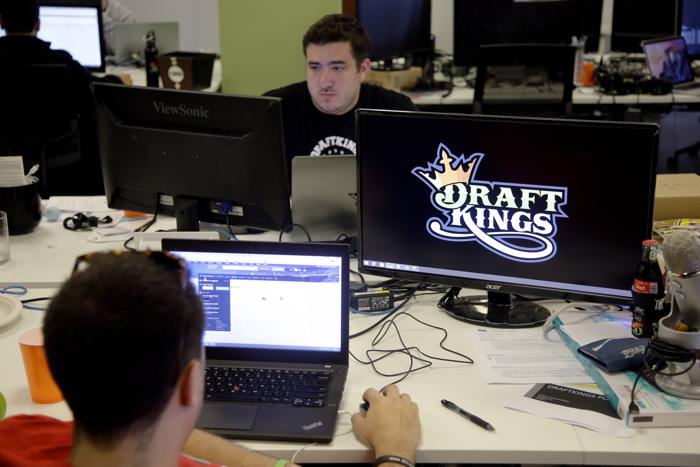From: http://www.boston.com/business/
The daily fantasy sports companies at the center of a firestorm over consumer safeguards and internal controls have grown real big, real fast. And interviews with the CEOs of Boston-based DraftKings and New York-based FanDuel conducted before the turmoil show they have sprawling aspirations.
The controversy began when a DraftKings employee with access to internal information won $350,000 on FanDuel. Because the companies services are so similar, it sparked concerns about whether the insider access provided a leg up.
A DraftKings internal review cleared the employee of wrongdoing, and both companies have since banned employeesfrom playing competitors’ games. But the uproar sparked a nascent class-action lawsuit, and raised questions about the integrity of the games, industry best practices, and fantasy sports regulations—or the lack thereof.
Founded in 2009, FanDuel became the market leader in daily games, an offshoot of traditional full-season fantasy sports. DraftKings launched in 2012 and quickly leapt toward the top of the standings as FanDuel’s most viable challenger.
Earlier this year, the two companies combined were estimated to control as much as 90 percent of the market, and that was before they launchedmassive advertising campaigns ahead of football season. The market has grown fast: DraftKings has said revenue jumped more than 1,000 percent between 2013 and 2014, and FanDuel projects revenue to triple this year.

Going global
DraftKings opened an office in London late this summer to serve as its European headquarters, and has begun hiring there. CEO Jason Robins said the London office will provide two perks: recruiting—“London is an incredible place to get talent,” he said—and geography.
Hinting at the company’s international goals, he said a London base will make it easier to meet with leaders of top European soccer leagues to talk about marketing deals or partnerships. It’s not hard to imagine that other Euro-centric sports, like cricket or rugby, are also on DraftKings’ radar.
That would be in line with the company’s priority of quickly launching a wide array of contests, a key difference between DraftKings and FanDuel.
Different priorities
In addition to the four major American sports—football, basketball, baseball, and hockey—DraftKings users can play daily fantasy contests in soccer, pro fighting, golf, and NASCAR, none of which are available through FanDuel.
“When we sat down and built our initial infrastructure … we said, ‘How do we build a template that allows us to build any fantasy sport and create a game platform for that?’” Robins said. DraftKings can get any new game built within four weeks, he said.
FanDuel already has an office in Scotland with about 150 employees, and eventually intends to go global, CEO Nigel Eccles said. For now, though, the company is focusing more on riding the hot hands in the U.S.: football and basketball contests, which account for 80 percent of its business, he said. FanDuel also offers baseball and hockey games.
Eccles said launching new games, such as fantasy soccer, is not a current priority.
“Whenever we look at any feature—the introduction of a new sport or new feature—we want to do something that benefits most users,” he said.
Fresh approach
FanDuel broke with that gameplan recently when it acquired a fantasy competitive video gaming website, matching a DraftKings plan to offer a similar niche contest.
But FanDuel’s plan for growth is less focused on new games in new markets than on broadening its offerings beyond fantasy sports, Eccles said.
“We’re not really in fantasy sports,” Eccles said. “We’re in the sports engagement business.”
As an early example of this relatively new approach, he pointed to another recent acquisition: numberFire, a sports statistics analysis website. Some of its content will be integrated into FanDuel’s fantasy contests, but the site will also stand on its own, Eccles said.
The philosophical shift is meant to broaden the company’s overall market.
“There are 220 million sports fans in America, and we want to hit all of them,” Eccles said.
Turning heads
“Both companies have really been very impressive in terms of how much they’ve been able to do so quickly,” said Peter Schoenke, chairman of the Fantasy Sports Trade Association, which counts both Robins and Eccles on its board.
The companies have attracted more than $700 million in combined venture capital, with investors including big media companies, pro sports leagues and New England Patriots owner Robert Kraft’s The Kraft Group.
Matt Wong, an analyst at CB Insights, a company that studies venture-backed firms, said that it is common for companies in the late startup stage to seek strategic investors. The embrace from sports leagues came with some surprise, however, because some league officials had previously shunned daily fantasy contests, calling them a form of sports betting.
But thanks to the popularity of daily fantasy, the leagues quickly came around.
“We drive consumption of their content,” Robins said. “We drive interest and engagement with their games.”
New competition
Large public companies that have long offered traditional fantasy sports, Yahoo and CBS, each launched daily games this football season. DraftKings and FanDuel’s leaders said in late summer that they were confident they could withstand the new competition.
“Very early on, I always said if Yahoo were to come in, we’re probably in trouble. But the last year I was concerned about it was two years ago,” FanDuel’s Eccles said in September. “I think they’re pretty late. … Anybody who’s copying is always going to be six to 12 months behind.”
Not everybody is as bullish as industry insiders that the daily fantasy market will keep growing. A recent analysis by business consulting firmMcKinsey & Company predicted that existing casual players may fall off as professionalized players come to dominate the contests.
And that’s to say nothing of the possible effect of the recent controversy. With ambitions so large, DraftKings and FanDuel have plenty to lose.








Leave a Reply
You must be logged in to post a comment.